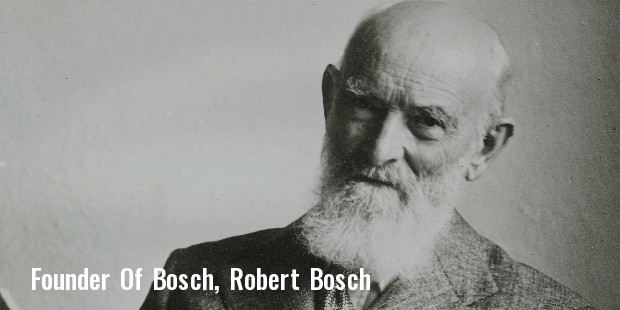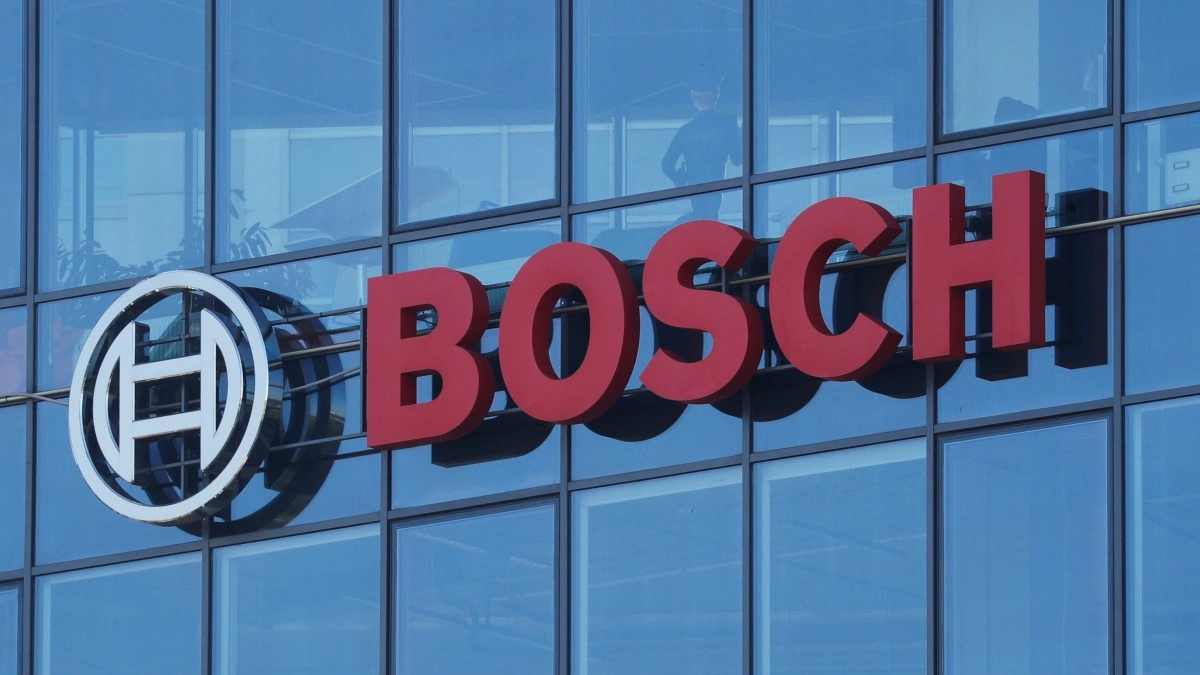Bosch is a multinational engineering, technology and services company headquartered in Gerlingen, Germany. It was founded in Stuttgart in 1886 by Robert Bosch and now employs roughly 421,000 associates worldwide. The company generated sales of 88.2 billion euros in 2022. Its operations are divided into four business sectors: Mobility Solutions, Industrial Technology, Consumer Goods, and Energy and Building Technology.
Bosch is a leading global supplier of technology and services. The company’s products and services are used in a wide range of applications, including automotive, industrial, consumer, and building technology. Bosch is also a major player in the Internet of Things (IoT) and artificial intelligence (AI) markets.
Bosch is committed to innovation and sustainability. The company invests heavily in research and development, and it is constantly developing new technologies and solutions that improve the quality of life for people around the world. Bosch is also committed to reducing its environmental impact, and it has set ambitious goals for reducing its energy consumption and greenhouse gas emissions.
Bosch is a global company with a strong local presence. The company has operations in over 150 countries, and it employs people from all over the world. Bosch is committed to diversity and inclusion, and it strives to create a workplace where everyone feels welcome and respected.
History of Bosch
Bosch was founded in Stuttgart, Germany, in 1886 by Robert Bosch. Bosch started out as a small workshop for precision mechanics and electrical engineering. The company’s first product was a magneto ignition system for gas engines.

Bosch quickly grew and expanded into other areas of technology. In 1902, the company developed the first electric starter for automobiles. In 1913, Bosch introduced the first diesel injection pump. And in 1927, Bosch developed the first fuel injection system for aircraft.
Bosch continued to innovate throughout the 20th century. In the 1950s, the company developed the first transistor radio. In the 1960s, Bosch introduced the first electronic fuel injection system for automobiles. And in the 1970s, Bosch developed the first ABS anti-lock braking system.
Bosch has continued to be a leader in automotive technology in the 21st century. The company has developed a number of new technologies, including electronic stability control, adaptive cruise control, and lane departure warning. Bosch is also a major player in the Internet of Things (IoT) and artificial intelligence (AI) markets.
Bosch is a company with a long and successful history. The company has been a pioneer in many technological fields, and it has played a major role in shaping the modern world.
Major Milestones of Bosch
- 1886: Robert Bosch founds the Workshop for Precision Mechanics and Electrical Engineering in Stuttgart, Germany.
- 1898: Bosch opens its first foreign branch in London.
- 1902: Bosch develops the first electric starter for automobiles.
- 1913: Bosch introduces the first diesel injection pump.
- 1927: Bosch develops the first fuel injection system for aircraft.
- 1932: Bosch develops the first spark plug with a platinum tip.
- 1951: Bosch develops the first transistor radio.
- 1967: Bosch introduces the first electronic fuel injection system for automobiles.
- 1978: Bosch develops the first ABS anti-lock braking system.
- 1996: Bosch introduces the first ESP electronic stability control system.
- 2009: Bosch develops the first LED headlamp for automobiles.
- 2013: Bosch introduces the first automated driving system for city traffic.
- 2020: Bosch develops the first hydrogen fuel cell electric passenger car.
Bosch has continued to innovate and expand its product portfolio throughout its history. The company is now a leading global supplier of technology and services in a wide range of industries, including automotive, industrial, consumer, and building technology. Bosch is also a major player in the Internet of Things (IoT) and artificial intelligence (AI) markets.
Different Business Segments of Bosch
Bosch is a global technology and services company with operations in over 150 countries. The company is divided into four business sectors: Mobility Solutions, Industrial Technology, Consumer Goods, and Energy and Building Technology.
Mobility Solutions
Bosch’s Mobility Solutions sector is a global leader in the automotive industry. The sector develops and manufactures components and systems for cars, trucks, and other vehicles. Bosch is a leading supplier of automotive technology, including engines, transmissions, and electronics.
Some of the products and services offered by Bosch’s Mobility Solutions sector include:
- Engine management systems
- Transmissions
- Brake systems
- Electrical systems
- Electronics
- Safety systems
- Driver assistance systems
- Connected car services
Industrial Technology
Bosch’s Industrial Technology sector is a global leader in the manufacturing, construction, and other industrial applications. The sector develops and manufactures products and solutions that help customers improve their productivity, efficiency, and safety.
Some of the products and services offered by Bosch’s Industrial Technology sector include:
- Automation technology
- Power tools
- Security systems
- Sensors
- Software
- Motion control
- Machine tools
- Welding equipment
- Packaging equipment
Consumer Goods
Bosch’s Consumer Goods sector is a global leader in the household appliances, power tools, and security systems industries. The sector develops and manufactures products that make people’s lives easier and more comfortable.
Some of the products and services offered by Bosch’s Consumer Goods sector include:
- Home appliances
- Power tools
- Security systems
- Garden tools
- Heating and cooling systems
- Security systems
- Home automation systems
Energy and Building Technology
Bosch’s Energy and Building Technology sector is a global leader in the energy and building industries. The sector develops and manufactures products and solutions that help customers save energy, improve comfort, and protect the environment.
Some of the products and services offered by Bosch’s Energy and Building Technology sector include:
- Heating and cooling systems
- Security systems
- Building automation systems
- Renewable energy systems
- Smart home systems
Bosch is a company with a long and successful history. The company has been a pioneer in many technological fields, and it has played a major role in shaping the modern world. Bosch is a company that is constantly looking to the future, and it is committed to providing innovative products and services that improve the quality of life for people around the world.
Financials of Bosch over the years
here is a summary of Bosch’s financials over the years:
| Year | Sales (in billions of euros) | Net income (in billions of euros) |
|---|---|---|
| 2022 | 88.2 | 5.3 |
| 2021 | 78.7 | 4.4 |
| 2020 | 72.5 | 3.6 |
| 2019 | 77.7 | 4.3 |
| 2018 | 73.7 | 4.1 |
As you can see, Bosch’s sales and net income have been growing steadily over the years. The company is a global leader in the automotive, industrial, consumer, and building technology industries, and it is well-positioned for continued growth in the years to come.
Here are some additional details about Bosch’s financials:
- Bosch’s largest market is Europe, which accounted for 38% of sales in 2022.
- The Americas accounted for 32% of sales, and Asia Pacific accounted for 29%.
- Bosch’s largest customer segment is the automotive industry, which accounted for 60% of sales in 2022.
- The industrial technology sector accounted for 25% of sales, the consumer goods sector accounted for 10%, and the energy and building technology sector accounted for 5%.
- Bosch has a strong balance sheet with a net debt-to-equity ratio of 0.3.
- The company has a healthy cash flow and generates enough cash to fund its operations and investments.
Bosch is a well-managed company with a strong track record of profitability and growth. The company is well-positioned for continued success in the years to come.
Bosch significant mergers & acquisitions over the years
Bosch has a long history of mergers and acquisitions, which have helped the company to expand its operations, increase its market share, and enter new markets. Here are some of the notable mergers and acquisitions of Bosch:
Rexroth: In 2001, Bosch acquired Rexroth, a leading provider of industrial hydraulics and automation systems. The acquisition allowed Bosch to expand its portfolio of products and services in the industrial sector. The acquisition of Rexroth in 2001 was a significant move for Bosch, as it allowed the company to expand its industrial automation offerings. Rexroth was a well-known provider of hydraulic, pneumatic, and electric drive and control systems, and its products were used in a wide range of industries including aerospace, automotive, and agriculture. The acquisition of Rexroth allowed Bosch to enter new markets and offer customers a more comprehensive range of products and services.
Blaupunkt: In 2008, Bosch acquired the car radio and navigation business of Blaupunkt, a subsidiary of the electronics giant Robert Bosch GmbH.
The acquisition allowed Bosch to enter the automotive infotainment market and offer customers a complete range of products and services for their vehicles. Bosch’s acquisition of the car radio and navigation business of Blaupunkt in 2008 was a strategic move to expand the company’s presence in the automotive industry. Blaupunkt was a well-known brand in the car audio and navigation market, and its products were used in many popular vehicle models. The acquisition allowed Bosch to integrate Blaupunkt’s products and technologies into its own offerings, and offer customers a complete range of products and services for their vehicles.
SPX Service Solutions: In 2012, Bosch acquired SPX Service Solutions, a leading provider of diagnostic and service equipment for the automotive industry. The acquisition allowed Bosch to expand its service offerings and provide customers with a comprehensive range of diagnostic and repair solutions.
The acquisition of SPX Service Solutions in 2012 was a significant move for Bosch’s automotive service offerings. SPX was a leading provider of diagnostic and service equipment for the automotive industry, and its products were used by service technicians to diagnose and repair vehicles. The acquisition allowed Bosch to integrate SPX’s products and technologies into its own offerings, and offer customers a comprehensive range of diagnostic and repair solutions.
Seeo Inc.: In 2015, Bosch acquired Seeo Inc., a start-up that developed advanced lithium-ion batteries for electric vehicles. The acquisition allowed Bosch to expand its presence in the growing electric vehicle market and offer customers more efficient and reliable battery solutions.
Bosch’s acquisition of Seeo Inc. in 2015 was a strategic move to expand the company’s presence in the growing electric vehicle market. Seeo was a start-up that had developed advanced lithium-ion batteries for electric vehicles, and its products were known for their high energy density and long life. The acquisition allowed Bosch to integrate Seeo’s battery technology into its own offerings, and offer customers more efficient and reliable battery solutions.
Akustica: In 2009, Bosch acquired Akustica, a leading provider of micro-electromechanical systems (MEMS) technology. The acquisition allowed Bosch to enter the market for MEMS microphones and expand its portfolio of sensors and semiconductors.
Bosch’s acquisition of Akustica in 2009 was a strategic move to expand the company’s portfolio of sensors and semiconductors. Akustica was a leading provider of MEMS technology, which is used in many electronic devices including smartphones and tablets. The acquisition allowed Bosch to enter the market for MEMS microphones and expand its presence in the semiconductor industry.
Overall, Bosch’s mergers and acquisitions have allowed the company to expand its operations, increase its market share, and enter new markets. The company’s focus on innovation and strategic partnerships has helped it to stay ahead of the curve and deliver value to its customers while maintaining a profitable and sustainable business model.
Success Factors of Bosch
Bosch’s success can be attributed to a number of factors, including:
Innovation: Bosch has a long history of innovation and technological advancement. The company has consistently invested in research and development to create new products and improve existing ones. This has allowed Bosch to stay ahead of its competitors and offer cutting-edge solutions to its customers.
Quality: Bosch is known for producing high-quality products that are reliable and durable. The company has strict quality control standards and uses advanced testing methods to ensure that its products meet the highest standards of quality.
Customer Focus: Bosch has a strong focus on understanding and meeting the needs of its customers. The company is committed to providing products and services that are tailored to the specific needs of its customers, and it works closely with them to develop customized solutions.
Global Reach: Bosch has a strong global presence, with operations in over 150 countries. This has allowed the company to tap into new markets and expand its customer base, while also leveraging its global resources to deliver products and services that are relevant and effective in different regions of the world.
Sustainability: Bosch is committed to sustainability and has implemented a number of initiatives to reduce its environmental impact. The company has set ambitious goals for reducing its carbon footprint and increasing the use of renewable energy sources.
Strong Brand: Bosch has a strong brand reputation built on a century of excellence in engineering and technology. The company’s brand is recognized and respected by customers around the world, which has helped it to maintain a competitive edge and attract top talent.
Strong management team: Bosch has a strong management team with a proven track record of success. The company’s management team is committed to long-term growth and profitability, and it is always looking for new ways to improve the company’s performance.
Overall, Bosch’s success can be attributed to its focus on innovation, quality, customer needs, global reach, sustainability, and strong brand reputation. These factors have enabled the company to stay ahead of the curve and deliver value to its customers while maintaining a profitable and sustainable business model.
Also Read: Siemens – The Strategies And The Success Factors
To read more content like this, subscribe to our newsletter




